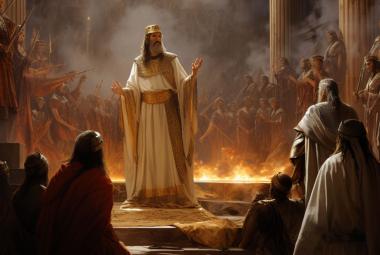When Moses asked Pharaoh to "Let my people go," Pharaoh responded, "Who is the Lord that I should obey His voice to let Israel go?" If Pharaoh could have read the book of Hosea, he would have known that the Lord was a sovereign God (Chapters 1-3); a holy God (Chapters 4-7); a just God (Chapters 8-10); and a loving God (Chapters 11-14).
Pharaoh, of course, never had the benefit of the depth of knowledge that Israel was given through the mouth and pen of the prophet Hosea, and yet the people were as stony-hearted toward God as Pharaoh was those many centuries before.
Hosea is one of the most remarkable books of the Old Testament. No other messenger gives so complete an outline of the ways of God with His earthly people as does Hosea:
1)God suffers when His people are unfaithful to Him;
2)God cannot condone sin;
3)God will never cease to love His own; and, consequently
4)He seeks to win back those who have forsaken Him.
Hosea was a contemporary of Isaiah (for most of his ministry) and Amos (in his earlier years); he was the "Jeremiah" of the Northern Kingdom. His main target was the Northern Kingdom, yet his message encompassed the entire people of God.
"Not My People"?
One of the pivotal insights occurs in the setting aside of his adulterous wife, and in the remarkable naming of his children: Jezreel, Lo-ruhamah ("not loved"), and Lo-ammi ("not my people"). The blood of Jezreel figures prominently throughout Israel's history and climaxes at Armageddon. In the New Testament the Holy Spirit confirms the application of these prophetic names to the State of Israel since they have been cast out of their land.1 Their restoration is one of the key pronouncements in Hosea. Dr. Charles Feinberg, an outstanding Jewish believer and scholar, says of Chapter 3:
"It rightfully takes its place among the greatest prophetic pronouncements in the whole revelation of God."
Hosea is frequently quoted in the New Testament and each time reveals some surprises.2
The Fatherhood of God
Among the provocative hermeneutical insights is the strange application of Hosea 11:1 by Matthew (2:15), which links the Fatherhood of God toward Israel and His calling His Son out of Egypt.3 He didn't just adopt them; He cared for them. How tenderly and compassionately the Lord taught and cared for His son, Israel. These words seem to parallel Moses' description of Israel's being carried through the wilderness as a father carries his son.4
In response to the love of God as seen in their redemption from Egypt, Israel, like a prodigal son, turned a deaf ear to God's prophets, choosing Baal and other idols instead.5
"The Best of Times and the Worst of Times"
Their material prosperity was unequaled since Solomon (2 Kgs 14:25-28; 2 Chr 26:2, 6-15). Jeroboam had recovered all the territory lost to Israel, even the possession of Damascus. Yet material prosperity is not a guarantee of safety to a people whose stability rests not on the moral basis of the fear of God and obedience to His laws. Hosea's warning was that God would use their enemies as His means of judgment. (We have explored the apparent parallels with America in our briefing pack, "Hosea, Can You See?")
An Incredible Book
The Lord's self-disclosure in Chapter 11 is so intense that many rank it as one of the greatest in the Bible. Perhaps among the most surprising of the prophetic insights in Hosea is the discovery of the prerequisites for the Second Coming of Jesus Christ.6
It is truly an amazing book and, like all of the books of the Bible, the Holy Spirit always rewards the diligent student. And Hosea is among the most rewarding.
Notes:
- Rom 9:26, "Not beloved"; 1 Pet 2:10, "nor having obtained mercy."
- Mt 2:15; 9:13; 12:7; Rom 9:25, 26; 1 Cor 15:55; 1 Pet 2:5, 10.
- Jesus always called God "my Father"; (e.g., Jn 20:17). The only time Jesus didn't call Him Father was when He was on the cross-in our shoes-and cried out, "My God, My God, why hast thou forsaken me?" (Cf. Ps 22). In the Old Testament, God is only called the father of Israel as a whole, never of individuals (14X: Ex 4:22; Ps 103:13; Isa 64:8; Jer 3:19,20; et al.)
- Deut 1:31-32; 32:10-11.
- Hosea 11:2, v.7; 2 Kgs 17:13; Jer 7:25; 25:4; Zech 1:4; et al.
- Hosea 5:15ff See also The Next Holocaust and the Refuge in Edom.






